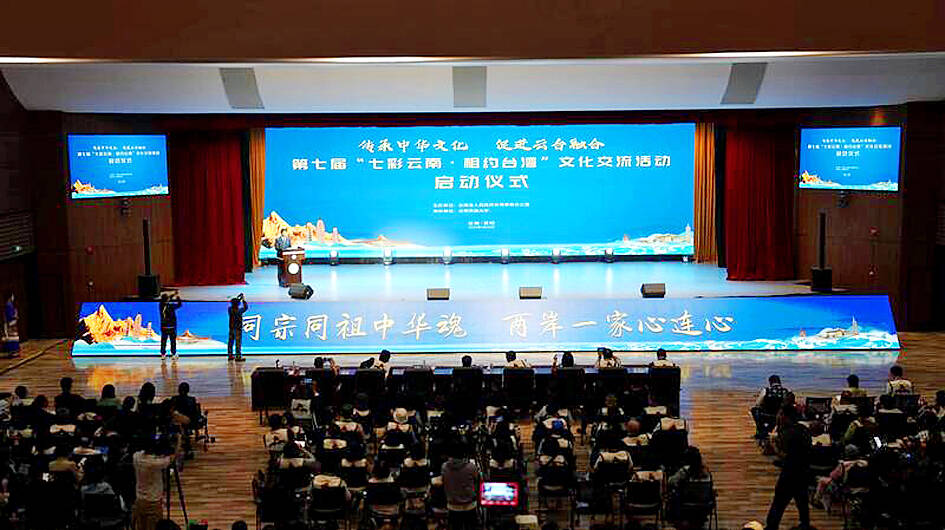The Council of Indigenous Peoples yesterday castigated a former legislator for repeating “united front” slogans during an exchange event in China, saying that Taiwan’s indigenous peoples are “not descendants of the Yellow Emperor.”
Former Chinese Nationalist Party (KMT) legislator and National Dong Hwa University professor Yosi Takun recently attended an event hosted by China’s Yunnan Minzu University.
Taiwan’s indigenous peoples are of Austronesian descent, speak Austronesian languages, and have an independent identity and culture, the council said in a statement yesterday.

Photo from the Yunnan Minzu University Web site
Experts criticized the event as a targeted “cultural united front” tactic seeking to reduce the subjectivity of the Austronesian-speaking peoples of Taiwan and define Taiwanese indigenous people as a Chinese ethnic minority.
National Cheng Kung University political science professor Hung Ching-fu (洪敬富) on Tuesday said that the banner — which read: “Both sides of the Strait share the same ancestry, Zhonghua spirit and are one big family” (同宗同祖中華魂、兩岸一家心連心) — flown at the event made no sense and was a blatant “united front” move.
Taiwan’s indigenous peoples are not descendants of Chinese emperors nor an ethnic minority, as defined by the Chinese government, the council added, rebuking Yosi’s claim that “minority cultures are an important part of Chinese civilization.”
Linguists said Taiwan’s indigenous languages share a deep historical and cultural connection with Austronesian languages, and are not connected to the Sino-Tibetan language family, it said.
They are not from the same ancestry, as claimed by China, it added.
Indigenous peoples are not a political tool, and any exchanges must be built on mutual respect and equality without pushing any political agenda, the council said.
Yunnan, as one of the most ethnically diverse provinces in China, has long been considered by the Chinese Communist Party (CCP) as a base to implement its “united front” rhetoric against Taiwan’s indigenous people, Hung said.
Yosi attending the event and accepting the position of visiting professor might result in many Taiwanese indigenous students at his university being drawn to Yunnan Minzu University, Hung said
Hung questioned the legality of Yosi’s visiting professor role, saying that if it was a paid position, the Ministry of Education and national security agencies should launch investigations.
Yosi said that he intended to foster future cross-strait exchanges between academics and students to facilitate cultural interaction and allow the next generation to build mutual understandings while exploring possible innovation.
A source, commenting on condition of anonymity, said that the event was hosted by the Yunnan Provincial Government’s Taiwan Affairs Office and organized by the Yunnan Minzu University.
The CCP invited delegations from the Taiwanese indigenous community, representatives of the Taiwan-Yunnan Association, the Taiwanese Businesspeople in Yunnan Association and the New Century Culture Arts Group, the source said.
Anyone participating in exchanges in China must remain highly vigilant and ensure that they are not exploited by the CCP in ways that contradict Taiwan’s democratic values and the dignity of indigenous peoples, the council said.

Taiwanese can file complaints with the Tourism Administration to report travel agencies if their activities caused termination of a person’s citizenship, Mainland Affairs Council Minister Chiu Chui-cheng (邱垂正) said yesterday, after a podcaster highlighted a case in which a person’s citizenship was canceled for receiving a single-use Chinese passport to enter Russia. The council is aware of incidents in which people who signed up through Chinese travel agencies for tours of Russia were told they could obtain Russian visas and fast-track border clearance, Chiu told reporters on the sidelines of an event in Taipei. However, the travel agencies actually applied

New measures aimed at making Taiwan more attractive to foreign professionals came into effect this month, the National Development Council said yesterday. Among the changes, international students at Taiwanese universities would be able to work in Taiwan without a work permit in the two years after they graduate, explainer materials provided by the council said. In addition, foreign nationals who graduated from one of the world’s top 200 universities within the past five years can also apply for a two-year open work permit. Previously, those graduates would have needed to apply for a work permit using point-based criteria or have a Taiwanese company

The Shilin District Prosecutors’ Office yesterday indicted two Taiwanese and issued a wanted notice for Pete Liu (劉作虎), founder of Shenzhen-based smartphone manufacturer OnePlus Technology Co (萬普拉斯科技), for allegedly contravening the Act Governing Relations Between the People of the Taiwan Area and the Mainland Area (臺灣地區與大陸地區人民關係條例) by poaching 70 engineers in Taiwan. Liu allegedly traveled to Taiwan at the end of 2014 and met with a Taiwanese man surnamed Lin (林) to discuss establishing a mobile software research and development (R&D) team in Taiwan, prosecutors said. Without approval from the government, Lin, following Liu’s instructions, recruited more than 70 software

Taiwanese singer Jay Chou (周杰倫) plans to take to the courts of the Australian Open for the first time as a competitor in the high-stakes 1 Point Slam. The Australian Open yesterday afternoon announced the news on its official Instagram account, welcoming Chou — who celebrates his 47th birthday on Sunday — to the star-studded lineup of the tournament’s signature warm-up event. “From being the King of Mandarin Pop filling stadiums with his music to being Kato from The Green Hornet and now shifting focus to being a dedicated tennis player — welcome @jaychou to the 1 Point Slam and #AusOpen,” the